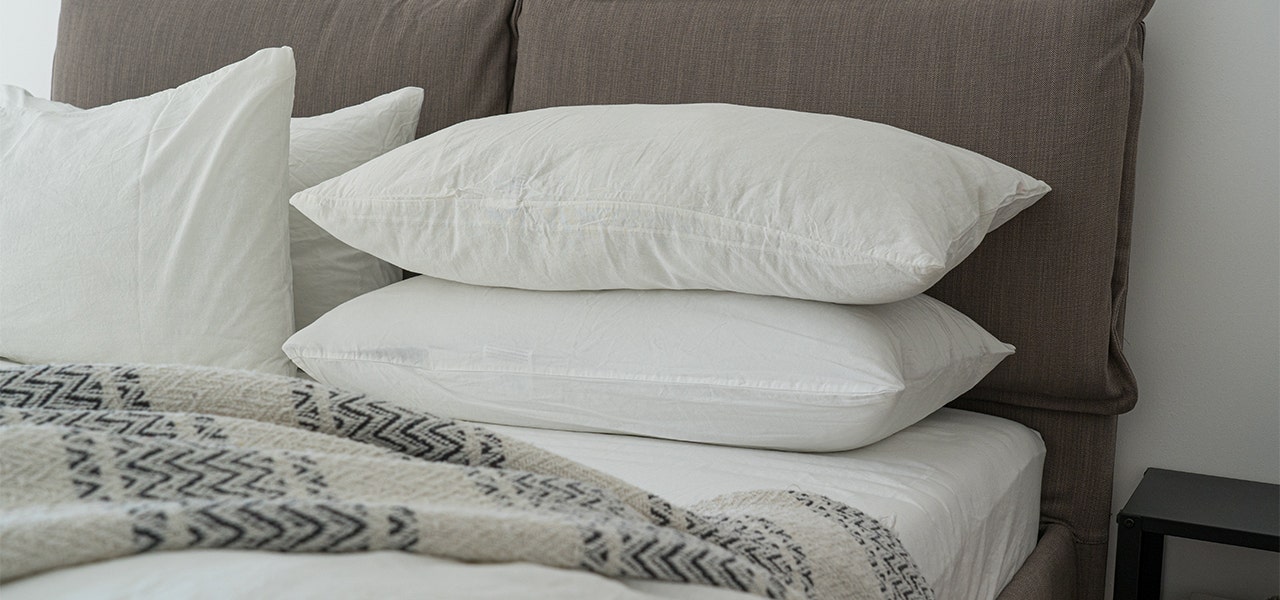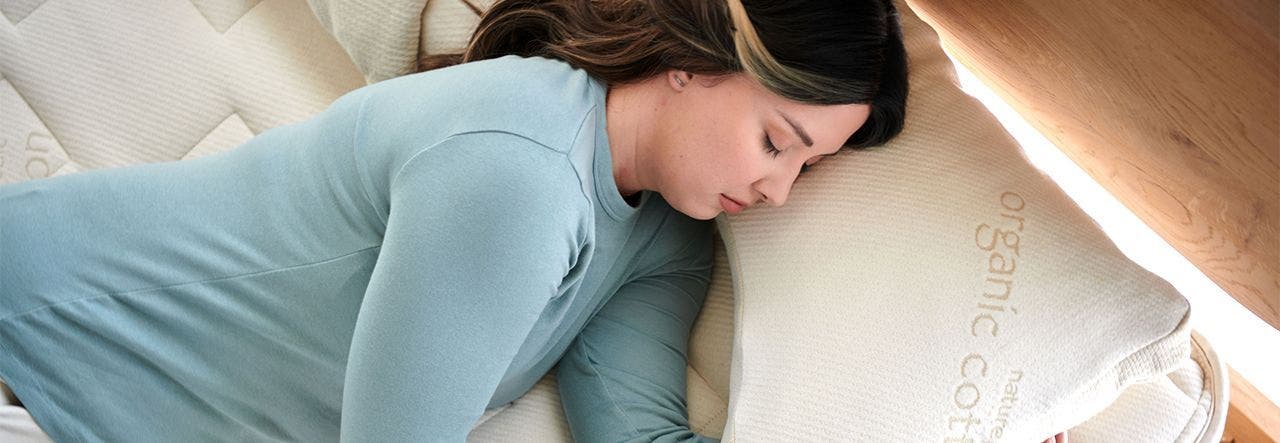You probably already know all about organic food and why you should avoid harsh pesticides on what you eat. In fact, most people’s introduction to the wonderful world of organic is at the grocery store.
Beyond food, choosing organic skincare and cosmetic products is gaining popularity. People want to avoid putting harsh chemicals on their faces and bodies, especially those that have been linked to premature signs of aging, skin cancer and more. Additionally, organic products are less likely to have undergone the animal testing that many cosmetics do.
But have you ever thought about what it means to choose organic bedding? More and more people are switching from conventional mattresses and bedding … but why organic? We’ll break it down for you.
What Makes Bedding Organic?


When it comes to bedding, organic takes on the same meaning as it does for, say, organic milk, produce or shampoo. It’s manufactured with fewer synthetic chemicals, making it healthier for the planet and for you.
If you’re asking yourself, “Wait … mattresses have chemicals in them?”, the answer is yes. Chemicals are in everything (and not all are bad!). However, in the case of case of conventional mattresses, you can expect a combination of chemical flame retardants, formaldehyde, vinyl/PVC, fiberglass and toxic adhesives. And there’s no screening process governing what goes in these mattresses, either, so you never really know what you’re getting … or what you’re getting yourself into.
You spend up to a third of your life sleeping. That’s a lot of direct exposure to potentially harmful substances. Certified organic bedding minimizes that risk through healthier materials, sustainable sourcing and rigorous testing processes.
8 Reasons Organic Bedding Is Better
When it comes to bedding, organic is always better – for the planet, for your family, for YOU! Why organic? Read on.
1. No Formaldehyde
Aren’t wrinkle resistant fabrics awesome? No! Though it is never obvious from the label, most anti-wrinkle treatments contain formaldehyde. You know, that chemical you smelled the day you dissected frogs in biology class? It can cause itchy skin, rashes, blisters and more – definitely not an ingredient you want in your soft, cozy bed!
The United States does not regulate formaldehyde levels in textiles. However, the Global Organic Textile Standard (GOTS) does. The only way to ensure your bedding is made without harmful chemicals like formaldehyde – and even scarier chemicals than that – is to choose certified organic.
2. Organic Cotton Sleeps Cooler
Synthetic fabrics and conventional mattress materials like memory foam can trap heat and leave you feeling hot and sweaty at night. Nobody likes to sleep hot, plain and simple. But did you know that sleeping hot can actually disrupt the quality of your sleep you’re getting and leave you waking up groggy?
You’ve probably seen mattresses and bedding advertised as having “cooling technology.” These products are usually chemically treated to help you sleep cooler. Even if they were effective – spoiler alert: they usually aren’t – isn’t that just solving a problem by creating another? In other words, risking your personal health through exposure to toxic chemicals every night of your life.
The better solution for hot sleepers is to choose a mattress that doesn’t require cooling technology in the first place. Organic cotton is a naturally breathable fabric, allowing for airflow and helping your body to naturally regulate its temperature – because our bodies do naturally want to sleep cool! Combine that with naturally moisture-wicking organic wool, and you can kiss those hot and sweaty nights goodbye.
3. Gentler on Skin


Have you ever been told to wash your clothes before you wear them for the first time? This advice is about more than just bacteria – it’s to protect your skin from harsh chemicals used in the manufacturing process. Organic cotton bedding is a safer choice for babies and people with sensitive skin, since it isn’t processed with GOTS-prohibited chemicals and detergents.
If you suspect that your non-organic bedding may be the culprit for your skin irritation, it may be time to make the switch. (And talk to your physician, too!)
4. Mindful of Mother Nature
A sustainability concern often raised in regard to cotton is that conventional cotton farming requires a lot of water. It currently takes 5,000 gallons of water to produce a single cotton t-shirt or pair of jeans, per WWF. Organic cotton farming, on the other hand, uses 91% less water than conventional cotton farming.
On top of that, organic cotton is grown without GOTS-prohibited pesticides, which seep into streams, soil and air and are a massive pollution source. Organic farming practices are regenerative, as opposed to conventional farming practices that devastate natural resources and leave soil unfit for growing.
5. Safer for Little Ones
Since our little ones have, well, littler bodies, they are especially sensitive to chemical treatments like pesticides, detergents and formaldehyde-containing treatments. This makes it important to buy safer bedding for your little ones – and if you’re anything like our team of parents and grandparents here at Naturepedic, protecting your little ones is your number one priority!
Certified organic bedding helps you minimize exposing your babies and kids to harmful toxins, protecting their developing brains and bodies. You won’t find flame retardants, formaldehyde or other GOTS-prohibited chemicals in a Naturepedic – it’s why we’re recommended by pediatricians, preferred by parents and loved by kids.
6. No Flame Retardants
Flame retardants … in mattresses? It’s true – a lot of clothing, bedding and furniture is chemically treated with flame retardants to meet government flammability regulations set forth in the 1970s. The problem is that A. These chemicals are toxic, B. They pose developmental risks for little ones and C. They do more harm than good in the event of a fire. Check out this post for a pediatrician’s breakdown of the risks posed by flame retardants.
This is one area where you need to be extra discerning. Organic standards like GOTS do allow for some amount of flame retardants. However, at Naturepedic, we go beyond the standard. All of our products pass government flammability requirements without the use of flame retardants.
7. No Harsh Chemical Dyes


Colorful and patterned sheets are pretty, but did you know that chemical dyes and colorants frequently contain heavy metals? These can include materials such as cadmium, lead, chromium and tin – and they are often not listed on the label. Organic cotton bedding is made without these types of dyes, which makes it safer for your health and gentler on your skin.
8. Stands up to Wear and Tear
Chemical treatments and dyes can weaken the fibers of conventional bedding, which means a thinner, flimsier feel and less durability. You spend a lot of time in bed – again, about a third of your life – so you need bedding that’s up to the task! Else, you’ll find yourself dropping money on new linens way more often than your wallet would prefer.
Organic cotton bedding is stronger and stands up to wear and tear better than conventional bedding, because it isn’t chemically processed. It’s durable enough to stand up to night sweats, tossing and turning, weekly laundering … whatever you throw its way!
 BABY
BABY  KIDS
KIDS  ADULT
ADULT  LEARN
LEARN  STORES
STORES 